 Petzlover
Petzlover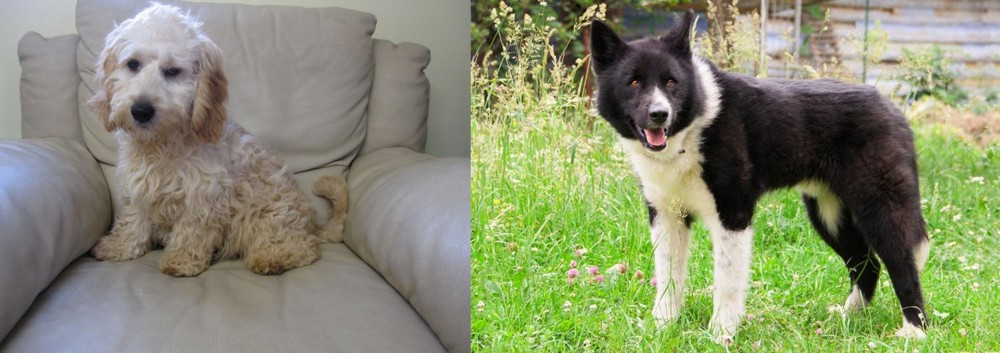 Cockachon is originated from United States but Karelian Bear Dog is originated from Finland. Cockachon may grow 21 cm / 8 inches shorter than Karelian Bear Dog. Cockachon may weigh 14 kg / 30 pounds lesser than Karelian Bear Dog. Cockachon may live 3 years more than Karelian Bear Dog. Both Cockachon and Karelian Bear Dog has almost same litter size. Cockachon requires Low Maintenance. But Karelian Bear Dog requires Moderate Maintenance
Cockachon is originated from United States but Karelian Bear Dog is originated from Finland. Cockachon may grow 21 cm / 8 inches shorter than Karelian Bear Dog. Cockachon may weigh 14 kg / 30 pounds lesser than Karelian Bear Dog. Cockachon may live 3 years more than Karelian Bear Dog. Both Cockachon and Karelian Bear Dog has almost same litter size. Cockachon requires Low Maintenance. But Karelian Bear Dog requires Moderate Maintenance
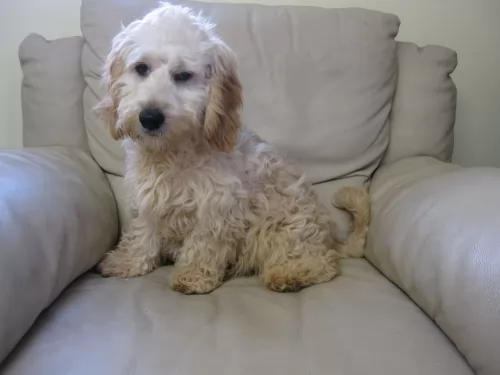 The Cockachon is not a pure bred dog but rather a cross between the Cocker Spaniel and the Bichon Frise. Very little if anything is known about who initially developed the Cockachon. It is known that the International Designer Canine Association (IDCA)registered and recognized the hybrid in 2009.
The Cockachon is not a pure bred dog but rather a cross between the Cocker Spaniel and the Bichon Frise. Very little if anything is known about who initially developed the Cockachon. It is known that the International Designer Canine Association (IDCA)registered and recognized the hybrid in 2009.
It is obviously a relatively new cross breed. The hybrid is also recognized by the American Canine Hybrid Club (ACHC), International Designer Canine Registry (IDCR) and the Designer Dog Kennel Club (DDKC).
 The Karelian Bear Dog is a Finnish Spitz-type dog who is regarded as a national treasure in the country. They have always been noted for their hunting skills, and because the dog has been found in ancient Viking graves you can assume it is an ancient breed.
The Karelian Bear Dog is a Finnish Spitz-type dog who is regarded as a national treasure in the country. They have always been noted for their hunting skills, and because the dog has been found in ancient Viking graves you can assume it is an ancient breed.
In fact the ancestry of the dog can be traced to neolithic times, when dogs followed human settlers to regions of Scandinavia and Europe.The American Kennel Club does not fully recognize the Karelian Bear Dog. It is however included in their Foundation Stock Service.
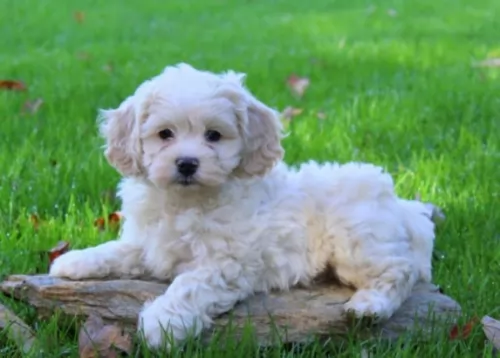 The Cockachon is a cute, little dog very popular in current times. He is small, compact, dark eyes, a round head and black nose. He has a baby face and fluffy hair. It has a furry tail and a blunt muzzle.
The Cockachon is a cute, little dog very popular in current times. He is small, compact, dark eyes, a round head and black nose. He has a baby face and fluffy hair. It has a furry tail and a blunt muzzle.
The Cockachon is a mix between the American Cocker Spaniel and the Bichon Frise. In order to get a better idea of what the hybrid can look like just look at the individual parents. The American Cocker Spaniel is a small dog with a short muzzle and domed head. It is in the Sporting Group, but it is the smallest member of the group. He has a compact, sturdy body and though domed his head is refined.
The Cocker’s stance includes a sloping topline, muscular hindquarters and strong shorter legs adds up to a balanced canine. The coat can be in a wide variety of colors including liver, golden, black, and red. Also, it could be liver and tan, black and tan, roan or tricolors. So, while the Bichon Frise is always white the Cockachon can be any of these colors including white. The types of coats that the Cocker Spaniel and the Bichon Frise have are very different as well.
The Bichon Frise is also a small dog, actually smaller than the American Cocker. The Cockachon usually ends up being about the size of the Bichon at 5-10 kg in weight and 23-30 cm in height. The skull of the Bichon Frise is round rather than domed and the muzzle is also rounded. The tail is long and curly while the Cocker would usually have a cropped tail. The nose and eyes of the Bichon Frise are black and its hair is dense and curly. Unlike the Cocker Spaniel it barely sheds.
Many Cockachon have floppy ears, curly coats and come in any variety of colors though many, many are white.
 Standing at between 54–60cm in height and weighing roughly 20–23 kg, the medium sized Karelian Bear Dog has a beautiful shiny coat. The outercoat is shortish, straight and dense and the undercoat is soft and thick.
Standing at between 54–60cm in height and weighing roughly 20–23 kg, the medium sized Karelian Bear Dog has a beautiful shiny coat. The outercoat is shortish, straight and dense and the undercoat is soft and thick.
The color of the coat is black with white markings. The dog has a bushy tail which curls in a circle over the back and the tail’s end is white. The ears of the dog are small and erect while the small eyes are intense.
It is best to have your Karelian Bear dog trained and socialized as he can tend to be aggressive towards other pets in the house, and even towards people he isn't familiar with. The owner of these dogs must be firm and fair with training as the Karelian is a strong-willed dog.
He is devoted to his human owners while being somewhat aloof and unfriendly with strangers. They are very territorial.
He is a very social dog and just loves spending time outdoors with his family. He is also good with children in the home as he is a playful dog.He is a dog who is going to require a lot of space to use up his energy. He needs a lot of mental and physical stimulation, as in the past he has always had a lot of work to do, and just loves being active. He is a confident, brave dog who takes his job as family protector seriously.
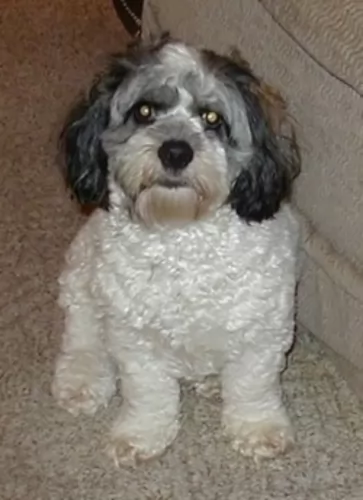 People created the Cockachon to get a small, lap or carry dog that had certain characteristics. These characteristics included a very social, loving dog. He is active and friendly, sweet and gentle. He is loyal, and loves being loved. He is great with other dogs and you can trust him with your children. He is a little independent but very loyal.
People created the Cockachon to get a small, lap or carry dog that had certain characteristics. These characteristics included a very social, loving dog. He is active and friendly, sweet and gentle. He is loyal, and loves being loved. He is great with other dogs and you can trust him with your children. He is a little independent but very loyal.
Like many little dogs he can have serious separation anxiety. Crate training is recommended so that he has a place to feel safe when you are not with him.
 Your energetic Karelian Bear Dog isn’t recommendeded for life in the city in a small garden. He needs a large garden or farm where he can run far and wide.
Your energetic Karelian Bear Dog isn’t recommendeded for life in the city in a small garden. He needs a large garden or farm where he can run far and wide.
Exercising him will be an important part if you own one of these dogs. He is a social, friendly, active family pet who happens to make a good watchdog too.
Make sure you have your Karelian Bear Dog trained and socialized and he’ll make you a wonderful friend and pet.
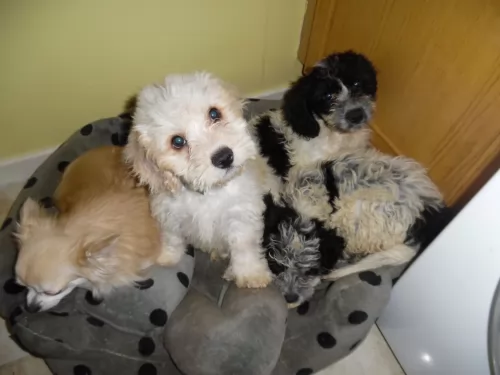 Hybrid dogs seldom have a lot of inherited diseases as they seem to jump a generation but if they do, it can be either a combination of both breeds issues or issues from just one of the breeds in the cross. For the Cockachon these issues include:
Hybrid dogs seldom have a lot of inherited diseases as they seem to jump a generation but if they do, it can be either a combination of both breeds issues or issues from just one of the breeds in the cross. For the Cockachon these issues include:
This loose kneecap issue is common to many small dogs and can cause lameness if not addressed.
Eyelid problems such as the ones that might bother a Cockachon can be found in many small dogs. These include Entropion and Ectropion.
 The Karelian Bear Dog can reach 10 to 12 years of age with good care, but just like with other dog breeds, he can be prone to certain health problems such as eye and dental problems as well as hip dysplasia.
The Karelian Bear Dog can reach 10 to 12 years of age with good care, but just like with other dog breeds, he can be prone to certain health problems such as eye and dental problems as well as hip dysplasia.
Many people don’t realize that dental problems are far more serious than what they imagine. An offensive breath can be the first warning sign of tooth decay with your canine friend.
There are other problems that can develop orally for your dog and these include inflammation of the gums, swollen gums and mouth tumors. You need to brush your pet’s teeth but also see to it that he goes for regular dental check-ups at the vet.
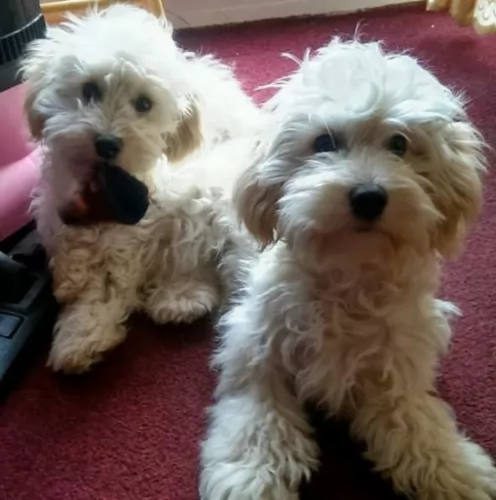 Don’t overfeed a Cockachon. Give him ¾ -1.5 cups of dry food of high quality in two meals per day.
Don’t overfeed a Cockachon. Give him ¾ -1.5 cups of dry food of high quality in two meals per day.
In addition to the issues listed above, the Cockachon is also prone to heart disease and cardiac issues.
The Cockachon has a lot of energy for its size. Make sure it gets plenty of exercise. If walks are the exercise of your choice make sure you walk him for 30 minutes a day. He loves to play, and a back yard would be nice. These little guys do well in obedience but are usually to small for agility.
 There are many people who just keep a dog for watchdog purposes and fail to make the pet a proper family member by meeting its physical and emotional needs.
There are many people who just keep a dog for watchdog purposes and fail to make the pet a proper family member by meeting its physical and emotional needs.
Caring for a dog means providing nutritious food and clean drinking water, seeing that he has a warm, dry place to sleep, providing the dog with exercise and ensuring the dog is healthy and content.
Caring for a dog is a big responsibility, and you have to think carefully before you bring a dog into your home and life.
You need to be careful with the food you select for your pet. If you’re feeding him a commercially manufactured food, you need to make sure to read the label and make sure the top ingredients are meat and not meat by-products. If this is something you’ve never thought about, ask your veterinarian for food recommendations.
Speaking of veterinarians, make sure you have a reliable, reputable vet you can call on. At some time or other your pet may get sick and then you want to have the name of a reliable vet in your contacts list on your cell phone. Sometimes your pet can become suddenly sick where he will need immediate, emergency help from the vet.
Just like you look after yourself, you need to look after your pet by brushing him, checking him for fleas, ticks and worms and keeping an eye on his eyes, ears, teeth and general health.